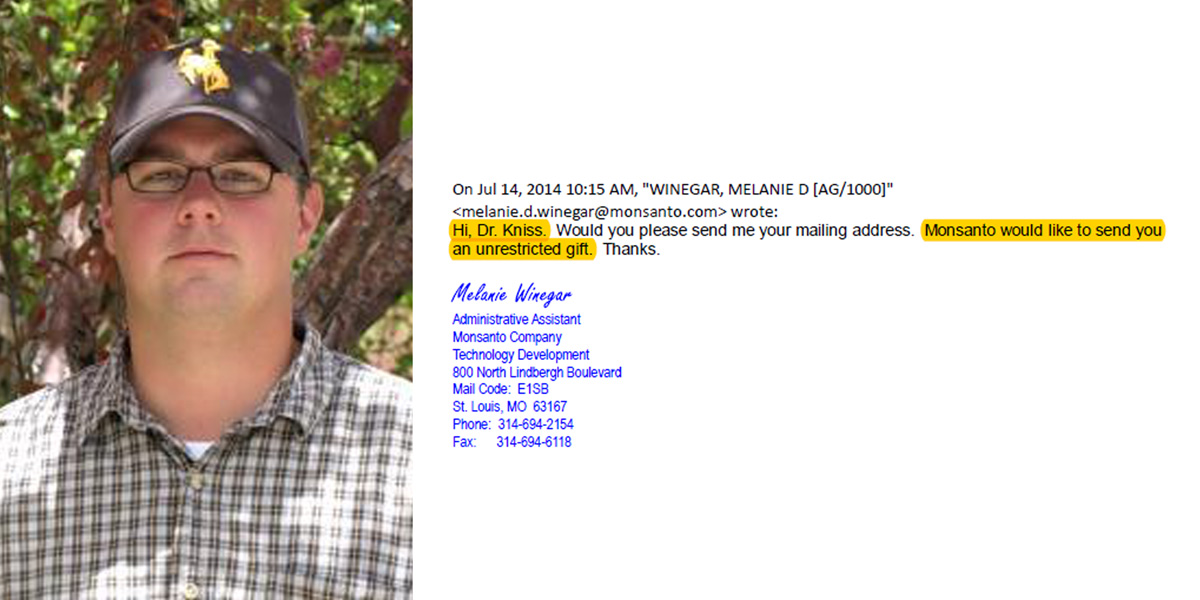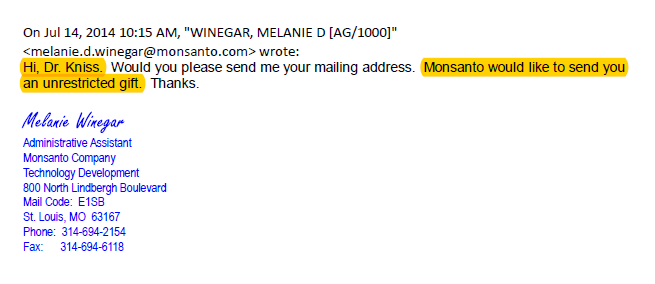
A university professor who defends pesticides and GMOs and is generally presented as independent was offered an "unrestricted gift" by Monsanto
Andrew Kniss is professor of weed biology and ecology at the University of Wyoming. He regularly appears in media outlets defending GM crops and pesticides, where he is described by his public affiliation. Kniss himself has been transparent about some of his research being sponsored by agrochemical firms, though not about the specific amounts he receives from particular companies.
These links to industry are generally not mentioned in the news stories. Nor have the media outlets that have uncritically quoted his views disclosed that he has personally been offered an "unrestricted gift" by Monsanto.
The wit and wisdom of Andrew Kniss
Kniss featured in an LA Times op-ed co-authored by the Hoover Institution’s Henry I. Miller last year. Titled, "No, California, Roundup won't give you cancer", the article aimed at discrediting the decision of California's Office of Environmental Health Hazard Assessment to add the weedkiller glyphosate to its list of chemicals that can cause cancer.
Kniss is not a toxicologist or an expert in public health. Nonetheless he was not shy about weighing in with his opinion that "even though glyphosate use has increased greatly over the last 25 years, my analysis suggests the relative contribution of glyphosate to the chronic toxicity hazard has remained relatively low. Glyphosate has a very low chronic toxicity compared to most other herbicides."
This statement reflects the decades-old industry PR line on glyphosate's toxicity, which has been rubbished by more up-to-date independent science that attests to the cancer-causing and liver-damaging effects of herbicides formulated with the chemical, among other toxic effects.
Kniss is also the author of a blog piece published on Jon Entine's Genetic Literacy Project (GLP) website. Kniss's blog criticized an influential article by Danny Hakim in the New York Times which questioned the hyped benefits of GM crops, notably that they increase yields and reduce pesticide use. The GLP tried to give an objective air to Kniss's critique by describing him as "an internationally respected independent plant scientist and weed specialist".
Similarly, Miller's article in the LA Times had described Kniss only by his public affiliation as "professor of weed biology and ecology at the University of Wyoming".
The GLP omitted to mention that Kniss had received research money from Monsanto and other agrochemical firms.
Now the Dutch news outlet OneWorld has published an internal Monsanto email disclosed in cancer litigation in the US, showing that the company offered Kniss an "unrestricted gift" of money. The email, from a Monsanto administrative assistant and dated 14 July 2014, says, "Hi, Dr. Kniss. Would you please send me your mailing address. Monsanto would like to send you an unrestricted gift. Thanks."

OneWorld stated that Kniss "cannot say exactly how much money" was involved.
Kniss attends GMO industry training session
OneWorld also revealed that Kniss attended an industry-sponsored media training event in Florida in 2014. The event was one of a series of industry-funded conferences organized to train scientists and journalists to frame the debate over GMOs and glyphosate in line with industry's wishes.
Funding for the media training was provided by the Biotechnology Industry Organization (BIO), a US lobby group for the GMO industry with which Monsanto is affiliated. The funding was not made transparent, but was uncovered by the journalist Paul Thacker.
Genetic Literacy Project links with Monsanto
We should not be surprised that Jon Entine's GLP did not declare Kniss's links with Monsanto. Entine has long had ties to companies like Monsanto and Syngenta. And lawyers suing Monsanto over glyphosate cancer concerns have stated that the GLP, an outfit that the lawyers said was "intended to shame scientists and highlight information helpful to Monsanto and other chemical producers", receives funding from Monsanto, although the GLP denies this.
What is not in doubt is that in internal documents released as part of the US cancer litigation, Monsanto described the GLP, along with the websites Biofortified and GMOAnswers, and the British-founded organisation Sense About Science, as one of its "industry partners".
Henry Miller links with Monsanto
Kniss's promoter Henry Miller has been exposed by the New York Times as having published an article in Forbes that was apparently ghostwritten by Monsanto.
Forbes then retracted several op-eds written by Henry Miller and the GMO and pesticide promoter Kavin Senapathy. Those articles were aggregated at the Hoover Institution, but the titles now lead to dead links.